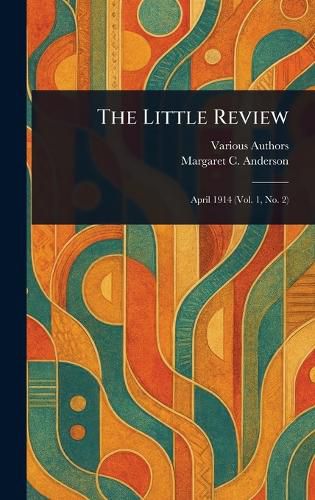Readings Newsletter
Become a Readings Member to make your shopping experience even easier.
Sign in or sign up for free!
You’re not far away from qualifying for FREE standard shipping within Australia
You’ve qualified for FREE standard shipping within Australia
The cart is loading…






This title is printed to order. This book may have been self-published. If so, we cannot guarantee the quality of the content. In the main most books will have gone through the editing process however some may not. We therefore suggest that you be aware of this before ordering this book. If in doubt check either the author or publisher’s details as we are unable to accept any returns unless they are faulty. Please contact us if you have any questions.
Delve into the heart of early 20th-century modernism with "The Little Review, Vol. 1, No. 2, April 1914," a captivating snapshot of avant-garde literature and art. This meticulously prepared print edition offers a rare glimpse into a pivotal moment in literary history, showcasing a diverse collection of poetry and prose that challenged conventions and pushed artistic boundaries.
As a key periodical of its time, "The Little Review" served as a platform for groundbreaking voices and innovative ideas. Explore the literary criticism and general literary collections that defined the era, reflecting European and modern perspectives. This volume offers invaluable insight into the evolution of literary expression and the intellectual currents that shaped the 20th century. A must-have for anyone interested in the roots of modern literature and the development of avant-garde thought.
This work has been selected by scholars as being culturally important, and is part of the knowledge base of civilization as we know it.
This work is in the public domain in the United States of America, and possibly other nations. Within the United States, you may freely copy and distribute this work, as no entity (individual or corporate) has a copyright on the body of the work.
Scholars believe, and we concur, that this work is important enough to be preserved, reproduced, and made generally available to the public. We appreciate your support of the preservation process, and thank you for being an important part of keeping this knowledge alive and relevant.
$9.00 standard shipping within Australia
FREE standard shipping within Australia for orders over $100.00
Express & International shipping calculated at checkout
This title is printed to order. This book may have been self-published. If so, we cannot guarantee the quality of the content. In the main most books will have gone through the editing process however some may not. We therefore suggest that you be aware of this before ordering this book. If in doubt check either the author or publisher’s details as we are unable to accept any returns unless they are faulty. Please contact us if you have any questions.
Delve into the heart of early 20th-century modernism with "The Little Review, Vol. 1, No. 2, April 1914," a captivating snapshot of avant-garde literature and art. This meticulously prepared print edition offers a rare glimpse into a pivotal moment in literary history, showcasing a diverse collection of poetry and prose that challenged conventions and pushed artistic boundaries.
As a key periodical of its time, "The Little Review" served as a platform for groundbreaking voices and innovative ideas. Explore the literary criticism and general literary collections that defined the era, reflecting European and modern perspectives. This volume offers invaluable insight into the evolution of literary expression and the intellectual currents that shaped the 20th century. A must-have for anyone interested in the roots of modern literature and the development of avant-garde thought.
This work has been selected by scholars as being culturally important, and is part of the knowledge base of civilization as we know it.
This work is in the public domain in the United States of America, and possibly other nations. Within the United States, you may freely copy and distribute this work, as no entity (individual or corporate) has a copyright on the body of the work.
Scholars believe, and we concur, that this work is important enough to be preserved, reproduced, and made generally available to the public. We appreciate your support of the preservation process, and thank you for being an important part of keeping this knowledge alive and relevant.